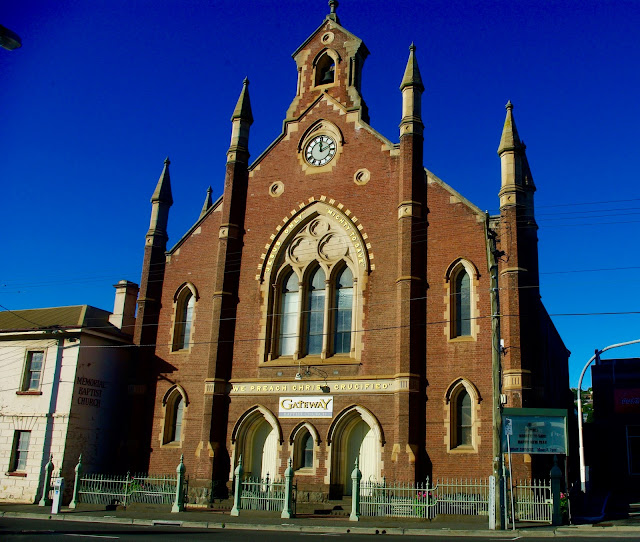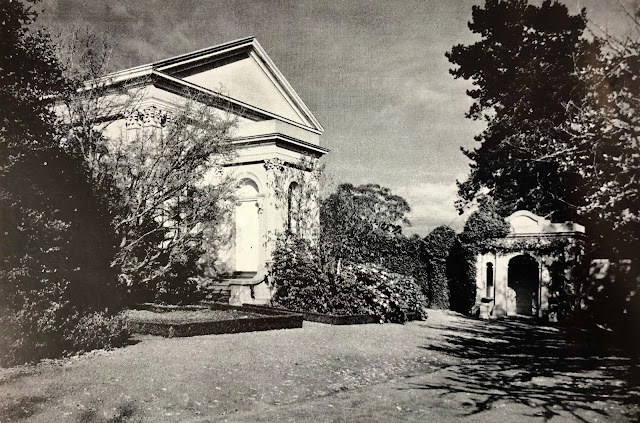No. 77 - The Memorial Baptist Church - Reed's Temple
This is one of the most visible churches in Launceston situated on Wellington Street, the busiest thoroughfare in the city. It is known for its quirky signboard on the street front with a clever turn of pun, forever attempting to attract potential customers. It is called the "Charcoal Chicken" church by some Launcestonians, in reference to an equally iconic business premises right on its boundary. This is the former Memorial Church named in honour of Henry Reed, founder of the city’s Christian Mission Church which now lies down an alley behind it. Reed was one of Tasmania’s leading businessmen as well as a banker and philanthropist besides being an ardent evangelist who made a significant contribution to the Christian cause in Australia and in Britain.
Henry Reed was born in Doncaster, England in 1806. At the age of 20 he sailed for Hobart arriving in April 1827. From Hobart he walked to Launceston, a distance of 120 miles. Reed had a deep religious experience in the early 1830's when a small boat he was rowing overturned on the Tamar River and he almost drowned. Once ashore, he knelt down to give thanks for his deliverance. This incident had an enormous influence on his religious life.
As a businessman he made his fortune through the acquisition of land and the use of convict labour. In 1828 Lieutenant-Governor Arthur granted Reed 640 acres along the Nile River. He soon acquired other properties near Launceston and established businesses in shipping, whaling, sealing and general trading out of Launceston to Hobart, Sydney, New Zealand and London. In 1831 Reed sailed for England where he married his cousin Maria Susanna Grubb.
Reed's enterprises helped the establishment of the new settlement of Melbourne with his loan of £3000 to John Batman. As a Wesleyan and a fervent evangelist he claimed to have preached the first sermon at Melbourne, his congregation being Henry and John Batman, William Buckley and three Sydney Aborigines.
In 1847 Reed returned to England where he remained for the next twenty six years. He undertook many preaching engagements throughout the north of England and was deeply affected by the widespread poverty he encountered there. Reed's wife died in 1860 and three years later he married Margaret Frith an ardent church worker. After this marriage his philanthropic interest increased. He became associated with General Booth and helped him with money and advice in the formative years of the Salvation Army.
In 1873, Reed returned to Tasmania settling at Mount Pleasant, one of the finest houses in northern Tasmania. He bought Parr's Hotel in Wellington Street as a site for his new Mission Church that opened for worship in July 1876. The new Memorial Church was built on the same site in front of the Mission Church, opening in 1885, almost five years after his death.
Following Reed’s death in 1880, his wife Margaret, decided together with the pastor and church elders of the Mission Church that a new building should be erected in her late husband's memory. The foundation stone was laid on July 19, 1883 and construction finished in 1885.
The Tasmanian reported on the progress made with the building in November 1884:
“The very handsome and commodious church, which has been for many months in course of erection in Wellington Street is now rapidly approaching completion… it is estimated that the …building will not be finished until the end of May next year…This has been, in great measure, due to the difficulty in obtaining suitable stone. The church has been built by Mrs Henry Reed, who bears the entire cost, £8,145 and is erected in memory of her late husband… The general design of the church is Gothic; the front elevation is 59ft wide and 70ft high to the top of the belfry finial. … The church is designed to seat upwards of a thousand people…”
The opening of the ‘Temple’ as it was called, was reported prominently in Tasmanian newspapers, including The Daily Telegraph:
“The large numbers that arrived at the Western Railway Station yesterday afternoon, showed that, despite the inclement weather, the congregation [that] would assemble at the new Temple in Wellington Street, would tax even the increased powers of the Christian Mission Church to provide accommodation for its worshippers…The number who came from Evandale, Perth, Longford, and Deloraine, besides a great many of Mrs Reed’s tenants from Wesleydale and Dunorlan, formed but a small portion of the crowds which assembled in Wellington Street between 6 and 7 o’clock…. By 7 o’clock over 1500 people were in the Church, filling not only the body and the galleries, but even all available standing room in the aisles and passages ….. After the hymn, Mrs Reed offered up a prayer, dedicating the church to the service of God and the salvation of souls".
The "Temple” later became known as the Henry Reed Memorial Church, until the church became part of the Baptist denomination in the 1930s when the name was changed to the Memorial Baptist Church. The building became known as the Gateway Baptist Church in 2002.
Today the church is particularly known for its culturally diverse congregation; more than half its parishioners are from Launceston's Bhutanese community. Reed’s church survives as a living memorial to one of Launceston’s most successful evangelist and philanthropists.
Henry Reed was born in Doncaster, England in 1806. At the age of 20 he sailed for Hobart arriving in April 1827. From Hobart he walked to Launceston, a distance of 120 miles. Reed had a deep religious experience in the early 1830's when a small boat he was rowing overturned on the Tamar River and he almost drowned. Once ashore, he knelt down to give thanks for his deliverance. This incident had an enormous influence on his religious life.
As a businessman he made his fortune through the acquisition of land and the use of convict labour. In 1828 Lieutenant-Governor Arthur granted Reed 640 acres along the Nile River. He soon acquired other properties near Launceston and established businesses in shipping, whaling, sealing and general trading out of Launceston to Hobart, Sydney, New Zealand and London. In 1831 Reed sailed for England where he married his cousin Maria Susanna Grubb.
Reed's enterprises helped the establishment of the new settlement of Melbourne with his loan of £3000 to John Batman. As a Wesleyan and a fervent evangelist he claimed to have preached the first sermon at Melbourne, his congregation being Henry and John Batman, William Buckley and three Sydney Aborigines.
In 1847 Reed returned to England where he remained for the next twenty six years. He undertook many preaching engagements throughout the north of England and was deeply affected by the widespread poverty he encountered there. Reed's wife died in 1860 and three years later he married Margaret Frith an ardent church worker. After this marriage his philanthropic interest increased. He became associated with General Booth and helped him with money and advice in the formative years of the Salvation Army.
In 1873, Reed returned to Tasmania settling at Mount Pleasant, one of the finest houses in northern Tasmania. He bought Parr's Hotel in Wellington Street as a site for his new Mission Church that opened for worship in July 1876. The new Memorial Church was built on the same site in front of the Mission Church, opening in 1885, almost five years after his death.
Following Reed’s death in 1880, his wife Margaret, decided together with the pastor and church elders of the Mission Church that a new building should be erected in her late husband's memory. The foundation stone was laid on July 19, 1883 and construction finished in 1885.
The Tasmanian reported on the progress made with the building in November 1884:
“The very handsome and commodious church, which has been for many months in course of erection in Wellington Street is now rapidly approaching completion… it is estimated that the …building will not be finished until the end of May next year…This has been, in great measure, due to the difficulty in obtaining suitable stone. The church has been built by Mrs Henry Reed, who bears the entire cost, £8,145 and is erected in memory of her late husband… The general design of the church is Gothic; the front elevation is 59ft wide and 70ft high to the top of the belfry finial. … The church is designed to seat upwards of a thousand people…”
The opening of the ‘Temple’ as it was called, was reported prominently in Tasmanian newspapers, including The Daily Telegraph:
“The large numbers that arrived at the Western Railway Station yesterday afternoon, showed that, despite the inclement weather, the congregation [that] would assemble at the new Temple in Wellington Street, would tax even the increased powers of the Christian Mission Church to provide accommodation for its worshippers…The number who came from Evandale, Perth, Longford, and Deloraine, besides a great many of Mrs Reed’s tenants from Wesleydale and Dunorlan, formed but a small portion of the crowds which assembled in Wellington Street between 6 and 7 o’clock…. By 7 o’clock over 1500 people were in the Church, filling not only the body and the galleries, but even all available standing room in the aisles and passages ….. After the hymn, Mrs Reed offered up a prayer, dedicating the church to the service of God and the salvation of souls".
The "Temple” later became known as the Henry Reed Memorial Church, until the church became part of the Baptist denomination in the 1930s when the name was changed to the Memorial Baptist Church. The building became known as the Gateway Baptist Church in 2002.
Today the church is particularly known for its culturally diverse congregation; more than half its parishioners are from Launceston's Bhutanese community. Reed’s church survives as a living memorial to one of Launceston’s most successful evangelist and philanthropists.
.jpg) |
| A postcard of the Christian Mission Church produced before it was renamed Henry Reed Memorial Church. Photograph supplied by Sallie Mulligan |
 |
| Photograph: Duncan Grant 2018 |
 |
| Photograph: Duncan Grant 2018 |
 |
| Photograph: Duncan Grant 2018 |
 |
| Photograph: Duncan Grant 2018 |
 |
| Photograph: Duncan Grant 2018 |
Sources:
Daily Telegraph Friday 3 July 1885
Examiner Saturday 29 June 1935
Examiner 30 July 2016
Tasmanian Saturday 22 November 1884
http://adb.anu.edu.au/biography/reed-henry-2582
Daily Telegraph Friday 3 July 1885
Examiner Saturday 29 June 1935
Examiner 30 July 2016
Tasmanian Saturday 22 November 1884
http://adb.anu.edu.au/biography/reed-henry-2582




Comments
Post a Comment